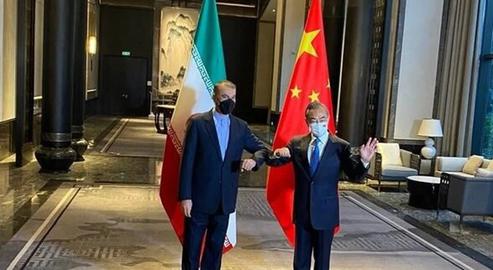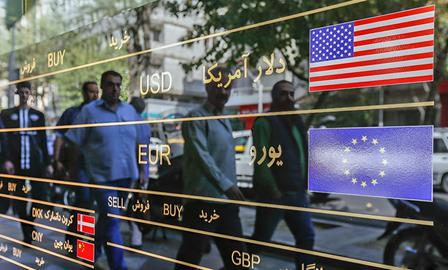The Iran-China 25-year cooperation deal has made headlines over the past few years, sparking public anger in Iran and prompting concerns overseas. But the disquiet was not limited to critics of the regime. The Iranian think-tank Resistance Economy has published a new article on the possible long-term ramifications of the deal, entitled Explaining China's Debt Trap Diplomacy and Doctrines for Iran, which warns officials of the consequences to come.
What is China’s “Debt Trap”?
To maintain its heavy economic influence abroad, the Chinese government has entered into a welter of agreements with other countries that ultimately place these other parties in China’s debt. Major infrastructure projects such as the Belt and Road Initiative is set to cost some 70 client countries trillions of dollars, with even China’s president Xi Jinping acknowledging that a “debt-sustainability framework” would be necessary.
Many of the deals include clauses on the concealing of lending provisions from the public, the requirement to open a collateral account with a Chinese bank, and other measures contrary to international lending standards. The Chinese banks, meanwhile, are not allocating their financial assistance to the areas most needed by the target countries, but in the areas where the Chinese economy needs to be developed. In many cases, they have not seen the desired return as client countries have been unable to repay them.
The debt trap is sometimes considered a precondition for cooperation, and sometimes comes about as a result of it. In the case of the Iran-China deal, Iran has bought into massive Chinese investment – to the tune of $400bn over 25 years – in its oil and petrochemical sectors, as well projects such as renewable energy and civilian nuclear energy, the construction of highways, railways and maritime connections, and banking and digital cooperation.
Pro-State Think Tank’s Concerns
The report from Resistance Economy probes the reasons why the Iran-China deal was kept a secret from ordinary citizens in both countries at China’s request. This obfuscation led to a wave of public anger when the draft content was eventually leaked. The main reasons officials kept it quiet, the report states, were military, commercial and sanctions-related.
But in a rare move, the article – published by a journal that consistently supports the Islamic Republic – went on to criticize officials of the Islamic Republic for the potential “harms” of this secrecy, and to raise the alarm about the potential debt trap. Statistics show that from 1949 (the foundation of the People's Republic of China) to 2017, China has green-lit at least 1,970 loans and 2,940 grants were granted by Beijing to 152 developing or emerging countries. Some of these, the report said, had indebted lower-income countries to China’s political advantage.
The Characteristics of Chinese Loans
According to the report, a very large volume of foreign loans granted by China are also subject to confidentiality clauses. Of 100 loans reviewed by the authors, all those related to the China Development Bank and about half of those involving the Export-Import Bank of China are non-public. Normally in such contracts, the burden of keeping bound loan confidential is on the lender, but in contracts involving China, the borrowing party is expected not to discuss it either.
Another difference in that in deals in which China is a parry, the conditions – up to and including the terms of payment and repayment of the loan, and the size or even existence of the loan itself – are often hidden. One of the most common ways in which China secures loan repayments is to compel the borrowing country to create a special bank account in a Chinese-approved bank, often the lender bank, and to keep it topped up with funds in various ways for the lifetime of the loan.
The Paris Club is a group of officials from major creditor countries around the world whose role, working in close partnership with the International Monetary Fund, is to alleviate the burden of debt on lower-income countries by negotiating reschedules or debt reduction. In many of its agreements, China has barred would-be borrowers from resorting to any kind of multilateral mechanism such as the Paris Club, which could lead to a reduction in liabilities.
In the 100 contracts studied, Chinese lenders were also given the right to cancel it based on political or economic developments not necessarily related to the contract itself. For instance if the debtor takes any action in his country against the interests of the People's Republic of China, non-payment and mutual cancellation of the contract will be imposed.
"Mutual Non-Payment" is another key feature of Chinese contracts: if the debtor is unable to pay an instalment, the lender can demand a full and immediate repayment or cease providing services immediately. Beijing can also sever diplomatic relations in response to a client state falling behind on payments, increasing its bargaining power over developing countries.
Chinese banks also use a constraint called the “Stability Requirement” to manage the risks of changing legislation in the borrowing country. A clause entitled “Regulation of Economic Equilibrium” states that the debtor country is obliged to pay additional costs to China in the event of any domestic law change that threatens the contract. Most of the agreements from China also consider “political change” in the same manner as non-payment of the loan.
The report’s authors note: "The risk of this restriction in lending agreements with Chinese banks, which are generally state-owned entities, is that possible changes could affect all banks and contracts at once, and all contracts between a country and Chinese state-owned banks unilaterally."
Reducing the Risks of the Iran-China Deal
The Resistance Economy writers conclude that the 25-year deal with China contains both sanctionable trade provisions and long-term military and political privisions; that is to say, the non-publication of its contents is “justifiable”. However, it sets out a list of “must-haves” the Islamic Republic needs to consider in its economic cooperation with China.
Criticizing the prioritization of "politically motivated" economic super-projects in the Islamic Republic in general, the report wrote that Tehran ought to have an “economic roadmap” in place that properly appraised the country’s needs. It also called on the Islamic Republic to take a stand against “the inclusion of mechanisms such as mutual non-payment and reciprocal termination of contracts", and to diversify "Chinese banks and institutions cooperating with the Iranian side" to prevent "chain links between projects and China".
The report also advised: "Under no circumstances should financial auditing of projects financed by Chinese banks be entrusted to companies providing Chinese financial services. In this regard, the Iranian side should be given priority in financial auditing of projects by trusted Iranian companies."
Related coverage:
Is the Iran-China Deal Legally Valid?
Zarif Tries to Justify the China Deal to Thousands on Clubhouse
What Do We Know About the Iran-China Deal?
Filmmakers who Criticized China Deal Threatened with Blacklisting
Ahmadinejad Warns About Iran's Long-Term Agreement with China
Iranian Luminaries Join Forces to Say No to China Deal
Exclusive: Iran Agrees to be China's Client State for the Next 25 Years
Khamenei Buys into China’s “New Silk Road” Plan
Exclusive: Javad Zarif is "Frustrated" With the Guards and the Government
Communications Minister on Clubhouse: Blocking Websites is Obsolete
visit the accountability section
In this section of Iran Wire, you can contact the officials and launch your campaign for various problems





















comments